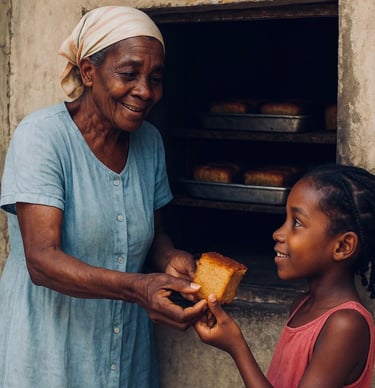The Fire Still Burns: Bread, Faith, and the Ashes of Haiti
After Haiti's 2011 quake, a home baker recalls stories of resilience, where faith rose like bread from the ashes of sorrow, kneaded by love and legacy.
SOJOURNER
Wandering Armenian
6/22/20253 min read


The Fire Still Burns: Bread, Faith, and the Ashes of Haiti
A Devotional Reflection
"Though the mountains be shaken and the hills be removed, yet my unfailing love for you will not be shaken..."
— Isaiah 54:10 (NIV)
In the early months of 2011, Port-au-Prince still smelt of dust and memory. Rubble replaced rooftops, and silence echoed where laughter once sang from sun-drenched courtyards. I stood outside a crumbling home bakery in Delmas 7 District of this quaint little capital port city-a cracked clay oven still holding heat beneath its scars. Beside it, just near the entrance was standing fragile looking about six- and half-foot tall kind but firm faced Haitian lady. She was lovingly referred to as Mama Élise, a woman well into her sixties with hands like carved mahogany, dusted her flour-stained apron.
“The fire still burns,” she whispered, not about the oven, but about her hope. I was out there on Thursday afternoon along with the program officer, a local national and the program manager, a Bolivian young economist who had the passion to serve the needy and downtrodden. As an evaluation team member, we had been briefed about the program objectives and its goals and also about the few selected beneficiaries like Mala Elise, who had been fighting the odds of life not as a result of the great earthquake that changed the face of the country, but she has been facing hardships for a pretty long time. But she strived hard to keep her little business or place of work up and running no matter what came by.
The smell of pain patate and cassava bread drifted like a souffle down the alleys of the heart of the Delmas 7. Mama Elise made cake in her sixties, and she made it with holy ritual, her hands preserved the rhythm of three generations. Her small tin-roofed kitchen had been a refuge and a witness- the walls of which had been the chorus of whispered supplication to God by her grandmother during the revolution “Mama used to say bread baked in darkness still carries light,” she’d say, smiling softly.
In those dangerous days, her grandmother had served weary missionaries by the light of the lantern, disregarding curfews and the fear. Today, a few decades later, the same recipe fed rescue workers, barefoot kids, and refugee mothers who had sheltered around the fallen schoolhouse.
There was unrest and strength in the city. There was a certain vibration of doubt along the street, and within the bakery of Mama Elise time breathed at ease. The generosity in the oven directed the bread on resurrection and Godly grace. She handed a slice of warm pain patate to a young girl whose family had lost everything. “Ti manmi used to bake this for hope,” she said.
And hope, in Delmas 7, still tasted like sweet bread—born in fire, shared in love.
When she opened to me the family livre du foi (book of faith) an old, tattered notebook of prayers in Creole, reproductions of recipes handed down, mixtures of the two. The old Cyprian proverb that her father always used to say was, bread without salt like faith without trials. The earthquake had stolen her house, her son and half her village. However, it did not take her faith. I bake, in order not to forget, but to remember, said she. Each loaf was a resurrection—a silent defiance against despair.
We sat at her porch watching children running after falling mango and laughter. There were bruises but deeper still was grace. Words of Isaiah were present in her life: everything in her life was shaken but the love of God was not taken away.
As the bread rose that evening, so did our spirits. The fire did not consume her-it refined her.
I guess I can sum up my walk through the dusty streets of Delams district and the meeting with Mama Elis in the following words -
In broken walls, God built her song,
Through bitter loss, He made faith strong.
From ash and earth, her loaves were fed,
With hands of hope and daily bread.

